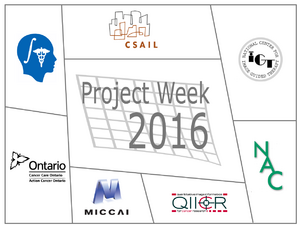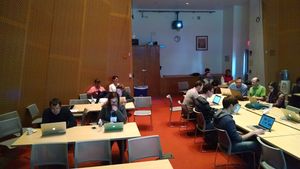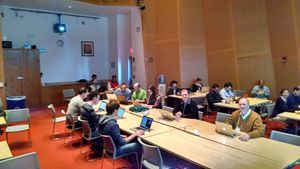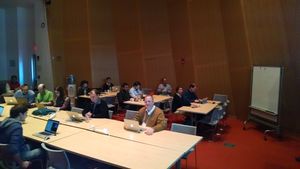Difference between revisions of "2016 Winter Project Week/Breakout Sessions/QIICRTools"
| (10 intermediate revisions by 2 users not shown) | |||
| Line 1: | Line 1: | ||
| + | __NOTOC__ | ||
| + | [[image:PW-MIT2016.png|300px]] | ||
=QIICR Tools= | =QIICR Tools= | ||
| + | [[Image:Boston2015-QIICR-group1.jpg|300px]] | ||
| + | [[Image:Boston2015-QIICR-group2.jpg|300px]] | ||
| + | [[Image:Boston2015-QIICR-group3.jpg|300px]] | ||
==Goal== | ==Goal== | ||
| Line 7: | Line 12: | ||
The session is aimed at the users and developers interested in the scope of QIICR work. Anyone interested is welcome to attend this session. | The session is aimed at the users and developers interested in the scope of QIICR work. Anyone interested is welcome to attend this session. | ||
| + | Project members expected to attend: | ||
* Andrey Fedorov, BWH | * Andrey Fedorov, BWH | ||
* Ethan Ulrich, U. Iowa | * Ethan Ulrich, U. Iowa | ||
| Line 45: | Line 51: | ||
* MRI / glioblastoma (Xiao Da) | * MRI / glioblastoma (Xiao Da) | ||
** DSC MRI modeling | ** DSC MRI modeling | ||
| − | *** | + | *** http://slicer.org/slicerWiki/index.php/Documentation/Nightly/Modules/DSC_MRI_Analysis |
** DCE MRI modeling | ** DCE MRI modeling | ||
*** http://wiki.slicer.org/slicerWiki/index.php/Documentation/Nightly/Modules/PkModeling | *** http://wiki.slicer.org/slicerWiki/index.php/Documentation/Nightly/Modules/PkModeling | ||
| Line 52: | Line 58: | ||
===DICOM informatics tools=== | ===DICOM informatics tools=== | ||
| + | * DCMTK API | ||
| + | ** http://support.dcmtk.org/docs-snapshot/mod_dcmseg.html | ||
| + | * Command-line conversion tools (supporting use case in [1]) | ||
| + | ** conversion of SEG, RWVM, SR ([http://dicom.nema.org/medical/dicom/current/output/chtml/part16/chapter_A.html#sect_TID_1500 TID 1500 Measurement report]) DICOM objects: https://github.com/QIICR/Iowa2DICOM | ||
| + | ** conversion of SEG, integrated with Slicer: https://github.com/QIICR/Reporting/tree/master/SEGSupport | ||
| + | * User-level access to [http://thecancerimagingarchive.net The Cancer Imaging Archive]: https://www.slicer.org/slicerWiki/index.php/Documentation/Nightly/Extensions/TCIABrowser | ||
| − | ===DICOM learning | + | ===DICOM learning, supporting tools, interoperability activities=== |
| + | * A Searchable Index of the DICOM Base Standard: https://fedorov.cloudant.com/dicom_search/.site/index.html | ||
| + | * [https://atom.io/packages/dicom-dump dicom-dump plugin] for [http://atom.io Atom editor]: click interface to DCMTK dcmdump and dsrdump | ||
| + | * DICOM SEG "connectathon" at RSNA 2015, poster: https://goo.gl/0WGmqm | ||
===DICOM datasets=== | ===DICOM datasets=== | ||
| + | * [https://wiki.cancerimagingarchive.net/display/Public/QIN-HEADNECK QIN-HEADNECK collection on TCIA]: longitudinal PET/CT of head and neck cancer patients: includes CT, PET, RWVM, SEG, SR objects | ||
| + | |||
| + | ==References== | ||
| + | [1] Fedorov A, Clunie D, Ulrich E, Bauer C, Wahle A, Brown B, Onken M, Riesmeier J, Pieper S, Kikinis R, Buatti J, Beichel RR. (2015) DICOM for quantitative imaging biomarker development: A standards based approach to sharing of clinical data and structured PET/CT analysis results in head and neck cancer research. PeerJ PrePrints 3:e1921 https://doi.org/10.7287/peerj.preprints.1541v1 | ||
Latest revision as of 14:56, 7 January 2016
Home < 2016 Winter Project Week < Breakout Sessions < QIICRToolsQIICR Tools
Goal
Give an overview of the various tools from the Quantitative Image Informatics for Cancer Research (QIICR) project that are available now or are being developed.
Participants
The session is aimed at the users and developers interested in the scope of QIICR work. Anyone interested is welcome to attend this session.
Project members expected to attend:
- Andrey Fedorov, BWH
- Ethan Ulrich, U. Iowa
- Xiao Da, MGH
- Michael Onken, Open Connections GmbH
- Nicole Aucoin, BWH
- Christian Herz, BWH
Outline
Slide sets and summary documents:
- Introduction to QIICR (slides from CI4CC Faill 2015 symposium)
- Quantitative imaging: Structured reporting in 3D Slicer and beyond (slides from RSNA 2015 course)
- Quantitative image analysis tools: Communicating quantitative image analysis results (slides from RSNA 2015 course)
- Fedorov A, Clunie D, Ulrich E, Bauer C, Wahle A, Brown B, Onken M, Riesmeier J, Pieper S, Kikinis R, Buatti J, Beichel RR. (2015) DICOM for quantitative imaging biomarker development: A standards based approach to sharing of clinical data and structured PET/CT analysis results in head and neck cancer research. PeerJ PrePrints 3:e1921 https://doi.org/10.7287/peerj.preprints.1541v1
QIICR imaging biomarker analysis tools
- MRI / prostate cancer (Andrey Fedorov)
- DCE MRI modeling
- DWI MRI modeling
- Multiparametric MRI annotation workflow
- PET/CT / head and neck cancer (Ethan Ulrich)
- PET SUV correction
- PET tumor and hot node segmentation
- PET quantitative index extraction
- PET analysis workflow (PET-IndiC)
- MRI / glioblastoma (Xiao Da)
DICOM informatics tools
- DCMTK API
- Command-line conversion tools (supporting use case in [1])
- conversion of SEG, RWVM, SR (TID 1500 Measurement report) DICOM objects: https://github.com/QIICR/Iowa2DICOM
- conversion of SEG, integrated with Slicer: https://github.com/QIICR/Reporting/tree/master/SEGSupport
- User-level access to The Cancer Imaging Archive: https://www.slicer.org/slicerWiki/index.php/Documentation/Nightly/Extensions/TCIABrowser
DICOM learning, supporting tools, interoperability activities
- A Searchable Index of the DICOM Base Standard: https://fedorov.cloudant.com/dicom_search/.site/index.html
- dicom-dump plugin for Atom editor: click interface to DCMTK dcmdump and dsrdump
- DICOM SEG "connectathon" at RSNA 2015, poster: https://goo.gl/0WGmqm
DICOM datasets
- QIN-HEADNECK collection on TCIA: longitudinal PET/CT of head and neck cancer patients: includes CT, PET, RWVM, SEG, SR objects
References
[1] Fedorov A, Clunie D, Ulrich E, Bauer C, Wahle A, Brown B, Onken M, Riesmeier J, Pieper S, Kikinis R, Buatti J, Beichel RR. (2015) DICOM for quantitative imaging biomarker development: A standards based approach to sharing of clinical data and structured PET/CT analysis results in head and neck cancer research. PeerJ PrePrints 3:e1921 https://doi.org/10.7287/peerj.preprints.1541v1



